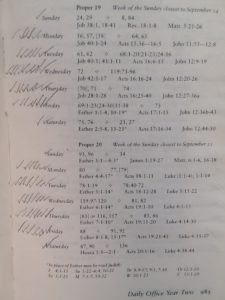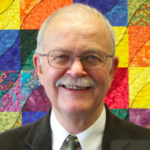
Most weekday mornings, while waking up with my first cup of coffee, I do that day’s readings from the “Daily Office Lectionary”, which is at the back of The Episcopal Church’s The Book of Common Prayer. As you can see from the photo with this blogpost, after I do the readings I put a check mark by that day to show that I’d done them. I’ve been doing this religiously, so to speak, for over fifteen years now, and there’s a parade of check marks across each page in the lectionary. I’m proud of them!
I started this practice the week I was released from a local hospital’s psych unit, where I had been hospitalized for major depression and an anxiety disorder. One of the Minnesota Conference’s associate conference ministers at the time suggested I try the lectionary. He told me that he was doing it and had found the practice calming and centering. This ACM had helped me in many ways, including in negotiating my disability payments, supporting the church that I had been serving, and supporting me as I struggled with guilt for what felt like abandoning my church. He’d already earned my trust, so I trusted his advice that following this lectionary would be helpful to me.
Fifteen years later, I’m still at it. When I first started the practice, muddle headed from an array of psych meds and distraught by the loss of all that had been normal in my daily life, I couldn’t hold words together and made little sense of what I was reading. But I could put a little check mark beside the reading for the day. This wasn’t cheating; I’d tried to read it, and at least I’d looked at it carefully. That counted. Each check mark gave me – they still do give me – a sense of accomplishment. After I had lost most of what had given my life a sense of meaning and purpose, a check mark was so much better than each day being another blank page.
This is my spiritual practice. It not only gives me a sense of accomplishment it also gives my life some structure. These days, now that I’m far into my recovery, there are many things on my calendar, though not as many as before the pandemic. But in the first months after my discharge, doing those lectionary reading was often the only thing that I had to look forward to. It was something I could count on even when so much else felt chaotic and totally beyond my control. What was true for my ACM turned out also to be true for me: The daily practice was calming and centering.
From the beginning reading “The Daily Office Lectionary” was my own free choice. It wasn’t meds, meals, or sleep; it wasn’t keeping an appointment with my therapist or psychiatrist. These were things I needed to do to survive. Reading the lectionary was different, not something imposed on me by life and mental illness, but something I had chosen to do for myself, an act of agency that transcended my illness. To me an agent is someone who gets to decide and has some mastery over their own life. As my recovery has continued, I’ve learned that this agency is tightly bound up with self-respect and well-being. It’s a recovery essential.

Bob Griggs
Ordained in 1973, Bob Griggs has served UCC churches in Massachusetts, New Hampshire, and Minnesota. He is an Advisory Council member at Vail Place, a club house for people living with mental illness. He is also the author of A Pelican of the Wilderness: Depression, Psalms, Ministry, and Movies and Recovering from Depression: Forty-Nine Helps.